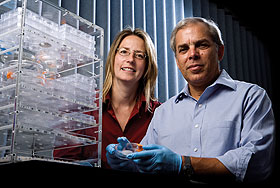UConnomy report highlights
impact of research on state's citizens
by David Bauman - February 2, 2009
|
Starting in the Jan. 26 issue and continuing for several weeks, the Advance will present portions of a report produced by the Office of University Communications in conjunction with a study conducted by Stanley McMillen, chief economist at the Connecticut Department of Economic and Community Development.
The report, UConnomy, outlines the many ways the University is vital to the state’s economic well being.
The full report and fast facts are available at www.uconn.edu/uconnomy.
Part of the report discusses research and innovation. It says faculty members from across the University, including the Health Center, are engaged in cutting-edge research projects aimed at transforming the lives of citizens – now and into the future: “Their work brings about the knowledge and innovations that will ultimately foster business development, an enhanced quality of life, improved education, and stronger economic growth in Connecticut and beyond.”
Examples include:
- The University’s Center for Applied Genetics and Technology focuses on improving the forensic DNA technology used by crime labs across the nation. Headed by molecular and cell biology professor Linda Strausbaugh, the Center brings together the Connecticut State Police Forensic Sciences Lab’s DNA Unit, UConn faculty, and corporate partners in researching new methods of DNA analysis.
- In 2008, the U.S. Department of Homeland Security selected UConn’s School of Engineering as the research lead of a National Center of Excellence in Transportation Security. In addition to advancing Connecticut’s security, the Center’s activities foster security-oriented business developments and provide training for the state’s transportation security workforce.
- The Connecticut State Data Center in the College of Liberal Arts and Sciences analyzes U.S. Census reports and tracks population trends affecting Connecticut. Studies include analysis of school populations and of demographic shifts that may change the state’s representation in Congress that help towns plan for the future.
 |
| Health Center researchers Liisa Kuhn and Jon Goldberg. Photo by Lanny Nagler |
- UConn stands at the forefront of stem cell research. Scientists on the Storrs campus and at the Health Center are learning what makes stem cells grow, how to affect their development and, ultimately, how to turn them into therapies to treat a host of diseases. The state-of-the-art Stem Cell Institute, to be completed this year, will soon house collaborative new stem cell research.
- Improving K-12 education in Connecticut schools remains a state priority. The University supports this effort through a range of research projects at the Neag School of Education, including the national reform initiative Teachers for a New Era, which prepares top quality future teachers.
- Scientists from across the University are immersed in the study of nanotechnology, an emerging discipline in which materials are examined and manipulated on a molecular scale. Faculty advances in this area hold great potential in diagnosing and treating disease, enhancing sustainable energy efforts, strengthening military defense capabilities, and building far more sophisticated electronics.
- As a participant in the National Institute for Pharmaceutical Technology & Education, the School of Pharmacy is working to bring new and safer medicines to market more quickly by collaborating with the U.S. Food and Drug Administration and others in the pharmaceutical industry.
- In the School of Nursing, Professor Patricia Neafsey, for example, is testing a software program that teaches the elderly about their medications and the risk of potentially dangerous drug interactions. It is estimated that reducing adverse self-medication behaviors could save $1 million or more a year in emergency health care costs.
|
|



